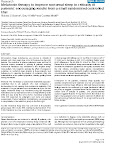 Recent news promotes melatonin’s ability to encourage sleeping longer and better. The results of a new study show that melatonin, an ingredient included in Res-Q Sleep, a dietary supplemental sleep aid, can help you sleep longer. A randomized double blind placebo controlled trial on humans showed that use of melatonin may add an extra hour of sleep. Additionally, the study also showed that melatonin helped people sleep better, improving their “sleep efficiency.”
Recent news promotes melatonin’s ability to encourage sleeping longer and better. The results of a new study show that melatonin, an ingredient included in Res-Q Sleep, a dietary supplemental sleep aid, can help you sleep longer. A randomized double blind placebo controlled trial on humans showed that use of melatonin may add an extra hour of sleep. Additionally, the study also showed that melatonin helped people sleep better, improving their “sleep efficiency.”
Melatonin, widely naturally occurring in nature by plants, animals and organisms, is produced in humans primarily in the brain by the pineal gland. Melatonin functions to encourage sleep by promoting the sleep-wake cycle, a cycle of when to awake and fall asleep. Melatonin is beneficial to third shift workers, and individuals who are awake at night, when their body would ordinarily want to go to sleep, and therefore have trouble sleeping during the day. Melatonin supplementation increases levels of melatonin in humans. Melatonin helps the body’s internal clock. Melatonin also benefits those with sleep cycles that are off balance from jet lag due to entering a new time zone.
Buy Res-Q Sleep or place an order with a Res-Q consultant by calling toll free 1-800-26-ALIVE.
References:
Melatonin therapy to improve nocturnal sleep in critically ill patients: encouraging results from a small randomised controlled trial, Critical Care 12 (2), R52 (18 Apr 2008)
Review Article: Melatonin: Nature’s most versatile biological signal? The FEBS Journal, May 15th 2006
No comments:
Post a Comment